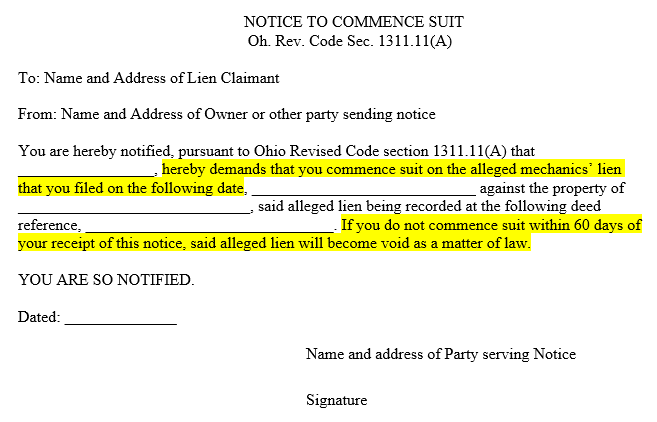
Serve Your Pennsylvania Mechanic’s Lien as Statute Dictates Or Risk Losing Your Lien
What happens if the Sheriff’s Office is unsuccessful in personally serving your mechanic’s lien upon the project owner? In Pennsylvania, failing to meet the service requirements dictated by the mechanic’s lien statute could result in lost lien rights. A fate that one lien claimant knows all too well.
Pennsylvania Mechanic’s Lien Rights
For projects costing $1,500,000 or more, the owner or an agent for the owner may file a Notice of Commencement on the State Construction Notices Directory, prior to the commencement of any labor, work or materials being furnished for the searchable project. If filed, the Notice of Commencement shall be posted at the jobsite.
You should file a Notice of Furnishing on the State Construction Notices Directory within 45 days after first furnishing labor or materials. No Notice of Furnishing is required when contracting directly with the owner or when a notice of Commencement has not been properly filed and posted. A Notice of Non-Payment may be filed on the State Construction Notices Directory, for informational purposes, but is not required to preserve lien rights.
Serve a Formal Notice upon the owner after last furnishing and at least 30 days before filing the mechanic’s lien. File the mechanic’s lien within 6 months after last furnishing. You should serve notice of filing the lien upon the owner within 1 month from filing the lien and file an affidavit of service within 20 days from serving notice of the lien upon the owner.
And that’s where Pennsylvania statute got the better of the lien claimant… serve the lien upon the owner.
Case: Americo Construction Company v. Four Ten, LLC
Americo Construction Company (Americo) timely filed a mechanic’s lien for $26,000 for work it performed to the improvement of property owned by Four Ten, LLC (Four Ten). After filing the mechanic’s lien, Americo hired the Sherriff to personally serve the lien upon Four Ten, which is precisely how statute instructs:
Title 49 P.S. Chapter 6, Sec. 1502 (c) Manner of service. Service of the notice of filing of claim shall be made by an adult in the same manner as a writ of summons in assumpsit, or if service cannot be so made then by posting upon a conspicuous public part of the improvement.
Americo advised the Sheriff that if personal service was unsuccessful, the Sheriff should post the lien to the property by a specified date to comply with statutory deadline of “1 month from filing the lien.” Seems OK, right?
According to the court of appeals’ opinion, the Sheriff’s first & second attempts at service were unsuccessful. The attempts were noted in the docket, but there was no indication whether a copy of the lien was posted at the property.
More than a month after the deadline to serve the lien, Americo received notification from the Sheriff on the failed attempts at service. Americo contacted the Sheriff and it was discovered the Sheriff had not posted the lien to the property as previously requested. Subsequently, the Sheriff went back to the property & posted the lien, then Americo filed an affidavit stating it served its lien.
- The lien was filed 6/21/2018.
- The lien needed to be served upon the owner by 7/21/2018.
- The lien was eventually posted at the job site 8/15/2018.
Americo’s lien was officially served… 25 days late.
Of course, property owner Four Ten contested the validity of the lien. “Four Ten filed preliminary objections contending that Americo ran afoul of the thirty-day service requirement contained in the Mechanics’ Lien Law.”
But is it Americo’s fault if the Sheriff didn’t follow the instructions Americo provided? Americo argued it did everything it was required to do in accordance with statute. The court agreed with Americo:
“Americo did everything it was required to do effect service under the statute and our case law. Indeed, we would find that Americo did everything it reasonably could do to ensure timely service.”
So, what’s the problem?
Regardless of Americo following statutory requirements, the lien itself was not served in compliance with statute. The court said:
“Nevertheless, it remains undisputed that Americo did not timely serve Four Ten under the Law despite all of Americo’s efforts. We cannot ignore the unanimous authorities providing that the Mechanics’ Lien Law must be strictly construed. Further, our authorities are unanimous in holding that a claimant cannot substantially comply with the timeliness requirements: either service was timely or it was not.… service was not timely made on Four Ten, Americo is not entitled to the enhanced benefits of the Mechanics’ Lien Law. Strict compliance with the time limits in the act serve the purpose of providing a date certain for owners and third parties to be assured of the absence of such claims. Americo still retains a possible remedy at law, but in the absence of timely service, Americo’s mechanics’ lien claim was properly stricken.”
You may be thinking “…man, Pennsylvania isn’t messing around.” And you’d be right; this isn’t the first (or last, I’m sure) time a lien claimant has been burned by failing to comply with statute. Pennsylvania statute is clear, and courts take no issue with enforcing it. Lesson? Follow the statute to the letter – always.









